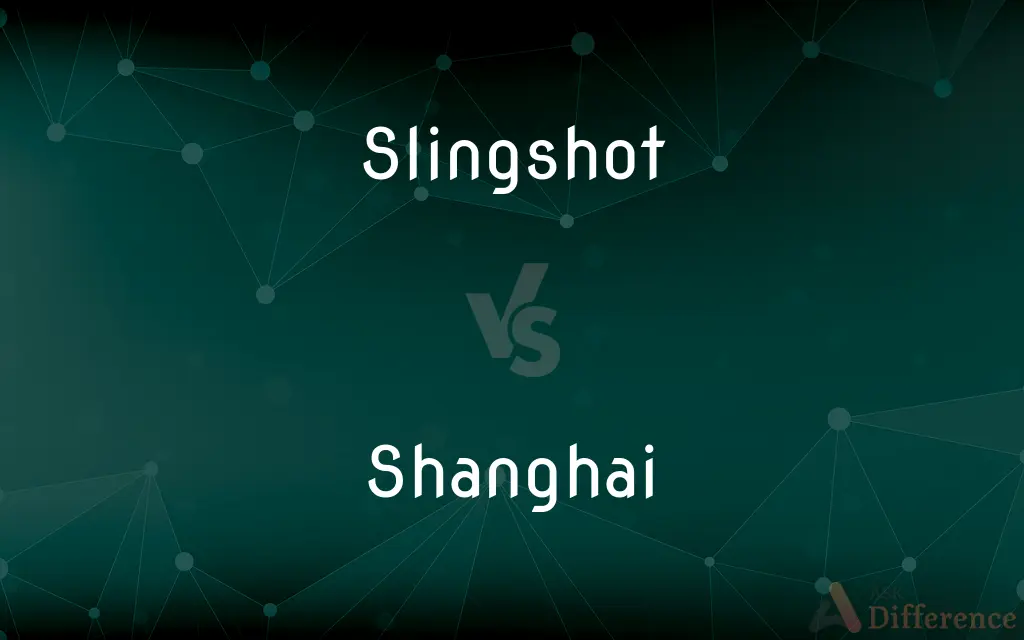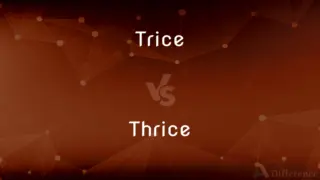Slingshot vs. Shanghai — What's the Difference?
By Tayyaba Rehman — Updated on November 7, 2023
A slingshot is a Y-shaped handheld device with an elastic component for launching projectiles, while Shanghai refers to both a major Chinese city and the act of coercing someone into an unwanted situation, historically into naval service.

Difference Between Slingshot and Shanghai
Table of Contents
ADVERTISEMENT
Key Differences
A slingshot is a simple handheld weapon used to launch small projectiles by means of an elastic band or pouch. It consists of a Y-shaped frame with bands attached to the two upper ends. Historically, slingshots have been used for hunting and recreation. They are often made from natural materials like wood and rubber.
Shanghai, on the other hand, is most widely known as the name of a major city in China, famous for its deep international heritage and modern economic significance. However, as a verb in historical context, "to shanghai" means to kidnap someone and force them to join a ship's crew, often by deceptive or coercive means. This practice was notably prevalent during the 19th century.
The word "slingshot" is purely a noun in English and does not function as a verb. It describes a tangible object used by an individual to shoot projectiles at targets. In contrast, while "Shanghai" is a noun when referring to the city, it becomes a verb when used in the context of coercion or abduction.
Using a slingshot requires manual skill and practice, as it is a tool of precision. It is light, portable, and was a common childhood toy for many. The action of "Shanghaiing," however, represents an illegal and forceful act that has been romanticized and dramatized in maritime lore and fiction.
In modern usage, the word "slingshot" can also metaphorically imply propelling something or someone forward quickly, whereas "shanghai" can mean to trick or compel someone into a position or situation against their will. These usages highlight the flexibility of English, where historical and literal meanings blend into contemporary idioms and expressions.
ADVERTISEMENT
Comparison Chart
Definition
A handheld device for shooting projectiles.
A city in China; or the act of coercing someone.
Function
To launch small objects.
To name a place; or to kidnap for naval service.
Usage as a Noun
Always refers to the device.
Refers to a city or the act depending on context.
Usage as a Verb
Does not function as a verb.
Used to describe coercion into service.
Historical Context
Used for hunting and play.
Refers to maritime practice of forced recruitment.
Compare with Definitions
Slingshot
A toy for shooting pebbles
The children played with a slingshot in the backyard.
Shanghai
A major city in China
I visited Shanghai for its incredible skyline.
Slingshot
An object used for flinging
With a slingshot, he launched the stone across the river.
Shanghai
An action of deceitful conscription
Pirates would often shanghai unsuspecting men.
Slingshot
A Y-shaped stick with an elastic band
He used a slingshot to hit the can.
Shanghai
Shanghai (Chinese: 上海, Shanghainese pronunciation [zɑ̃̀.hɛ́] (listen), Standard Mandarin pronunciation: [ʂâŋ.xài] (listen)) is one of the four direct-administered municipalities of the People's Republic of China, governed by the State Council. The city is located on the southern estuary of the Yangtze River, with the Huangpu River flowing through it.
Slingshot
A simple ancient weapon
David felled Goliath with a slingshot.
Shanghai
Force (someone) to join a ship lacking a full crew by drugging them or using other underhand means
They specialized in drugging and robbing sailors, sometimes arranging for them to be shanghaied aboard tramp boats
Slingshot
A metaphor for rapid acceleration
The startup was a slingshot in its industry.
Shanghai
Shoot with a catapult
In spite of his shanghaiing all the cats, the rodents were still on top
Slingshot
A slingshot is a small hand-powered projectile weapon. The classic form consists of a Y-shaped frame held in the non-dominant hand, with two natural-rubber strips or tubes attached to the upper two ends.
Shanghai
A city on the east coast of China, a port on the estuary of the River Yangtze; population 11,283,700 (est. 2006). Opened for trade with the west in 1842, Shanghai contained until the Second World War areas of British, French, and American settlement. It was the site in 1921 of the founding of the Chinese Communist Party.
Slingshot
A Y-shaped stick or frame having an elastic strap attached to the prongs, used for flinging small projectiles.
Shanghai
See Cochin2.
Slingshot
A Y-shaped stick with an elastic sling between the arms used for shooting small projectiles.
Shanghai
To kidnap (a man) for compulsory service aboard a ship, especially after drugging him.
Slingshot
(pinball) A stationary, often triangular object that launches any ball that hits its longest side back at a high force, now usually located above the flipper and between it and the inlane, with one each for both lower flippers.
Shanghai
To induce or compel (someone) to do something, especially by fraud or force:We were shanghaied into buying worthless securities.
Slingshot
A sling bikini.
Shanghai
(transitive) To force or trick someone to go somewhere or do something against their will or interest, particularly
Slingshot
Exercise equipment (powerlifting) An implement of a broad fabric worn around and connecting both bicipites brachii to support benching the most heavy weights.
Elastic band
Shanghai
To press-gang sailors, especially (historical) for shipping or fishing work.
Slingshot
To move or cause to move in a manner resembling a projectile shot from a slingshot.
Shanghai
To trick a suspect into entering a jurisdiction in which they can be lawfully arrested.
Slingshot
(especially) To use the gravity of a moving planet to add momentum to a spacecraft.
Shanghai
To transfer a serviceman against their will.
Slingshot
A plaything consisting of a Y-shaped stick with elastic between the arms; used to propel small stones
Shanghai
(transitive) To commandeer, hijack, or otherwise (usually wrongfully) appropriate a place or thing.
Let's see if we can shanghai a room for a couple of hours.
Shanghai
To hit with a slingshot.
Shanghai
A breed of chicken with large bodies, long legs, and feathered shanks.
Shanghai
A kind of daub.
Shanghai
A tall dandy.
Shanghai
A kind of dart game in which players are gradually eliminated ("shanghaied"), usually either by failing to reach a certain score in 3 quick throws or during a competition to hit a certain prechosen number and then be the first to hit the prechosen numbers of the other players.
Shanghai
Synonym of slingshot.
Shanghai
To intoxicate and ship (a person) as a sailor while in this condition.
Shanghai
A large and tall breed of domestic fowl.
Shanghai
The largest city of China; located in the east on the Pacific; one of the largest ports in the world
Shanghai
Take (someone) against his will for compulsory service, especially on board a ship;
The men were shanghaied after being drugged
Shanghai
Coerce into service on a ship
He was shanghaied onto a merchant vessel in 1853.
Shanghai
To compel or trick into something
She felt shanghaied into signing the contract.
Shanghai
A method of forced recruitment
The term shanghai comes from 19th-century practices.
Common Curiosities
What is a slingshot made of?
A slingshot typically has a Y-shaped frame made of wood or plastic and an elastic band.
Are slingshots legal?
Slingshots are legal in many places, but some regions have restrictions on their use.
Is "slingshot" ever used as a verb?
While not standard, "slingshot" can be used metaphorically as a verb meaning to propel something forward quickly.
Can "slingshot" refer to something other than a weapon?
Yes, "slingshot" can also metaphorically refer to a rapid advance or increase.
How do you use "shanghai" in a sentence?
As a noun: "Shanghai is a bustling metropolis." As a verb: "He was shanghaied into working late."
Is "shanghai" commonly used today?
As a verb, it's less common and somewhat archaic, but it's recognized in historical or literary contexts.
Are there cultural associations with "slingshot"?
Yes, slingshots are often associated with childhood and mischief.
How is a slingshot used?
A slingshot is used by pulling back the elastic band with a projectile in place, then releasing to shoot.
Is Shanghai a city or an action?
"Shanghai" can refer to both the city in China and the historical act of forcing someone into service.
What is the origin of the verb "shanghai"?
It originated from the practice of coercively recruiting sailors in the 19th century, often for voyages to Shanghai.
Can "shanghai" have a positive connotation?
Typically, "shanghai" has a negative connotation related to deception and coercion.
Has "shanghai" been romanticized in literature?
Yes, "shanghai" has been depicted in maritime literature and films, often with a romantic or adventurous tone.
What's the modern relevance of "shanghai"?
The term "shanghai" is often used metaphorically to describe being tricked into a situation.
Can "shanghai" be used in a legal context?
In legal contexts, it would likely refer to coercive or deceptive practices rather than maritime conscription.
Does "slingshot" have the same meaning in all English-speaking countries?
Yes, the meaning of "slingshot" as a handheld projectile launcher is consistent.
Share Your Discovery

Previous Comparison
Lease vs. Mortgage
Next Comparison
Trice vs. ThriceAuthor Spotlight
Written by
Tayyaba RehmanTayyaba Rehman is a distinguished writer, currently serving as a primary contributor to askdifference.com. As a researcher in semantics and etymology, Tayyaba's passion for the complexity of languages and their distinctions has found a perfect home on the platform. Tayyaba delves into the intricacies of language, distinguishing between commonly confused words and phrases, thereby providing clarity for readers worldwide.















































